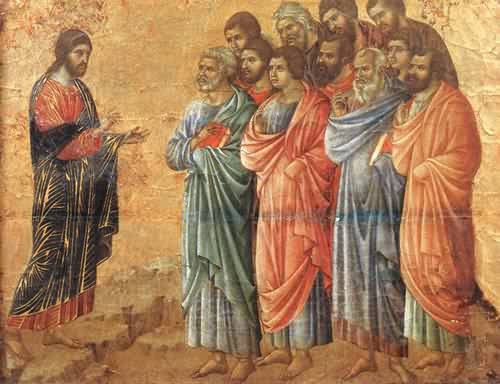
Stephen
Terry, Director

You
Will Be My Witnesses
Commentary
for the July 7, 2018 Sabbath School Lesson
 “Then
the eleven disciples went to Galilee, to the mountain where Jesus had told them
to go. When they saw him, they worshiped him; but some doubted. Then Jesus came
to them and said, ‘All authority in heaven and on earth has been given to me. Therefore
go and make disciples of all nations, baptizing them in the name of the Father
and of the Son and of the Holy Spirit, and teaching them to obey everything I
have commanded you. And surely I am with you always, to the very end of the
age.’” Matthew 28:16-20, NIV
“Then
the eleven disciples went to Galilee, to the mountain where Jesus had told them
to go. When they saw him, they worshiped him; but some doubted. Then Jesus came
to them and said, ‘All authority in heaven and on earth has been given to me. Therefore
go and make disciples of all nations, baptizing them in the name of the Father
and of the Son and of the Holy Spirit, and teaching them to obey everything I
have commanded you. And surely I am with you always, to the very end of the
age.’” Matthew 28:16-20, NIV
Forty days after Jesus’ resurrection, he was gathered
with his followers on the Mount of Olives outside Jerusalem. Like the Good Friday
of several weeks before, something momentous was about to happen. The eleven
remaining disciples and many others, including women who followed and supported
him throughout his ministry, were filled with awe when suddenly he was taken up
into heaven. Of course, they all could only guess that was his destination, but
their suspicions were confirmed when two angels affirmed that he was going into
heaven and would one day return from there as well.[i] He did not enter heaven in
a fiery chariot like Elijah, but entered more after the style of Enoch where
God simply took him. After Jesus had explained how his suffering and death had
to come before he could receive his kingdom, perhaps they thought he was going
to gather his angelic army and quickly return to set everything right. He may
have spent most of that day trying to clear up any misunderstandings his
disciples may have had. They may have also lingered until the sunset signaling
the approach of the Sabbath beckoned them home. This may be indicated by the
author, Luke, affirming that they were gathered only a Sabbath day’s journey
from Jerusalem.[ii]
This would alleviate any questions regarding the accuracy of the account based
on the disciples not traveling that far on the Sabbath when the sun set on
Friday evening.
Strangely, although there is no record of Jesus
commanding it, Peter, impetuous as was his nature, later stated that they
needed to choose another to replace the lost Judas. Perhaps this was because of
the importance of the number twelve to Jewish tradition, going all the way back
to the twelve patriarchs consisting of ten of Jacob’s sons and two of his
grandsons, Ephraim and Manasseh, sons of Joseph. The number is repeated many
times in prophecy both in literal references to the twelve tribes descended
from those men and with prophetic symbolism as in the one hundred and
forty-four thousand of Revelation which takes twelve times twelve and
multiplies it by a thousand.[iii] In order to have a full
dozen, they decide that they must select from those who have been with them
since the beginning and through the process of nomination and casting of lots
between the two principle candidates, they chose Matthias. While some accounts
of the Eastern and Coptic traditions have indicated that Matthias engaged in
foreign mission work, others, including “Foxe’s Book of Martyrs” have him
living and dying in Jerusalem. Even those accounts disagree as to whether he
died a martyr or of old age. Unlike most of the other apostles, he seems a
rather enigmatic fellow who was so much in the shadows that we are unable to
clearly see what he may have contributed to fulfillment of the gospel
commission.
Perhaps Jesus had another plan that may have been more
perfectly implemented had not Peter pushed for immediate resolution. As so
often happens with God, that plan was so seemingly impossible that it glorified
God rather than man through its eventual accomplishment. While Peter sought an
individual who was most in harmony with the disciples themselves, Jesus went
looking among those most opposed to his work. Who he found was Saul of Tarsus.
Perhaps more zealous than any other in opposing the early believers, even
supporting the stoning of Stephen, the first martyr,[iv] Saul, to become known as
Paul, was definitely not someone Peter or any others would have chosen on that
long-ago Pentecost to carry the gospel to the world. In fact, despite the
miraculous nature of Paul’s rebirth, he was not universally trusted and several
years passed before he met with the other Apostles in Jerusalem. In effect, he
had an independent ministry from that of the established leaders in Jerusalem.
He was perhaps better educated than most of them, if not all. But he had much
to re-examine from that education to determine how the amazing Jesus who had
accosted him outside of Damascus fit into that acquired knowledge. What he
ended up with was a far more egalitarian faith than the disciples had so far
been able to achieve. The importance of that egalitarianism to God was
underscored by Peter’s vision on the house top in Joppa.[v] As a result of that
vision, Peter became one of Paul’s supporters in reaching out with a message
that could be understood and accepted by those who were beyond Judaism, the
Gentiles. His influence was helpful when Paul sought accommodations from the Jerusalem
leadership that would make the Christian faith less legalistic and more
gracious toward those who had not been raised with the weight of Talmudic law
upon their backs. As is noted in his epistle to the Romans,[vi] Paul knew all too well
how difficult that weight had been to bear for the Jews, and he did not want to
place that burden upon the Gentiles as well. Had he not been willing to make
this simple, yet profound adjustment to the popular Jewish perspective,
Christianity might have ended up simply another sect of Judaism, like the
Essenes, relegated to a Levantine backwater, out of touch with the needs of the
world and so inwardly focused as to be practically useless beyond esoteric
theological disputes among the enlightened few. This was certainly nothing
Matthias was able to contribute to the movement. But God, who had the whole
world to choose from, could seek and call exactly who was needed for the task.
Paul’s stance on law and grace may seem somewhat
astonishing since he was a Pharisee by both birth and education. But two things
may have influenced his desire to accommodate his faith in order to reach the
Gentiles. First, he was raised in Tarsus as a Roman citizen and was therefore
exposed to the Roman perspective regarding citizenship and its obligations.
This would create a dynamic tension between what Rome expected of its citizens
and the demands of his Jewish faith. Perhaps it was a concern about the pull of
Rome on the young man’s heart that caused his parents to send him to Jerusalem
to study under the famous scholar, Gamaliel. However, that move likely resulted
in Paul receiving a broader education than he might have received had he
remained at home and been educated by the local synagogue. Gamaliel’s Hillel school not only studied the
Talmud, but also studied Greek philosophy and sought to glean truth from varied
and from what some might perhaps have considered disparate sources.
When we consider God making known his will through the miraculous calling of
Paul, we may wish to examine where we are today. Are we ensuring that our faith
remains as relevant to the needs of non-believers today as Paul saw was
necessary in his day? Or have we become so insular in our approach to belief that
we have made Christianity irrelevant in a time when the need for the teachings
of Christ was never greater? Jesus custom was to attend synagogue every Sabbath[vii] and most Christians seem
to find some relevance there. Even if they don’t get the day right, they attend
church weekly. The problem often comes in transitioning that practice into
something that extends beyond the walls of the building they gather in. Perhaps
that is because the building, rather than the one the building is dedicated to,
becomes the focus. Untold thousands of dollars, billions on a global level, are
poured into the maintenance of these structures that often become fortresses to
keep the world at bay rather than as outposts to nurture and care for the
hurting. Instead of engaging with the world, we fear it. In that fear we
testify to a powerless god who cannot overcome the evil in the world. We serve
a crucified Christ instead of a risen one. The real danger we face is of being
the church consisting of believers like those of Paul’s Second Epistle to
Timothy, “having a form of godliness but denying its power.”[viii] We can bemoan the secularism
of the world around us and its Post Modern Agnosticism and Atheism, but God has
placed the relevancy of our witness in our own hands. While he supports every
movement we make in the right direction, he does not compel us to do what is
necessary. We each have a place in maintaining that relevancy, and his Spirit
calls every willing heart to service the suffering of this world. There have been
many over time who have fallen aside like Judas. For
each one of them, God has another, like Paul, he calls to fill the breach.
Perhaps one of them is you.
